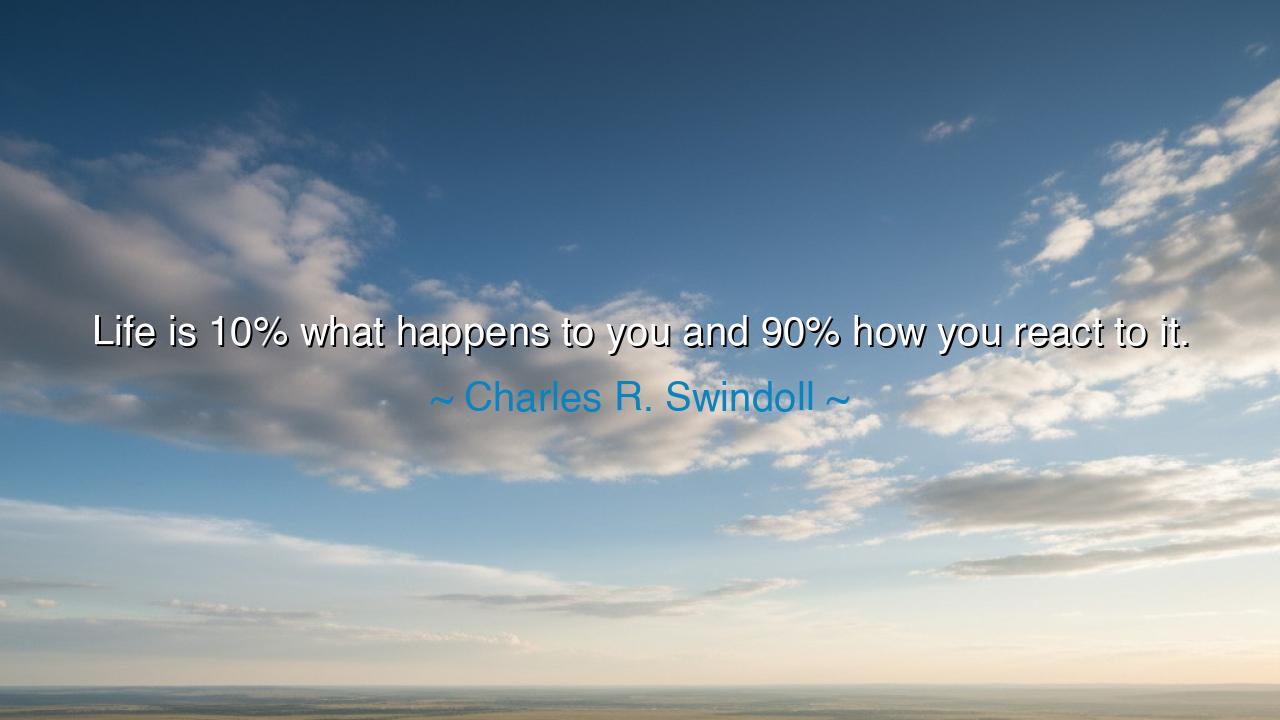
Life is 10% what happens to you and 90% how you react to it.






In the grand tapestry of life, where the threads of fate are woven in ways we cannot always understand, there is one truth that stands clear and unwavering. "Life is 10% what happens to you and 90% how you react to it." These words, spoken by Charles R. Swindoll, resonate with the wisdom of the ancients, for they call upon us to recognize our power in the face of adversity. In the ancient world, philosophers like Socrates and Epictetus spoke of stoicism, teaching that while we cannot control the events of life, we can control our response. The essence of this wisdom lies in the understanding that life itself is a constant flow of circumstances beyond our command, but it is how we react to those circumstances that defines the quality of our existence.
In every moment, we face the forces of life that shape our path—some kind and gentle, others harsh and unyielding. Yet, the key to our happiness, our success, and our peace lies not in the events themselves, but in how we choose to respond. The trials of life are inevitable, as certain as the rising sun and the falling night. Yet, it is our reaction—the way we face them—that determines our course. The ancients spoke of virtue as a measure of one’s character, and true virtue is born not in moments of ease, but in moments of challenge. In these moments, the wise do not falter; they rise, drawing strength from within, as a mighty oak draws its roots deeper into the earth when the storm rages.
Consider the example of Nelson Mandela, a man who endured 27 years of imprisonment under the brutal apartheid regime. His life was undeniably marked by hardship, yet what defines Mandela is not the suffering he endured, but his response to it. He did not let bitterness consume him, nor did he allow hate to darken his heart. Instead, he chose forgiveness, reconciliation, and the path of peace. In the face of unimaginable adversity, his reaction became a beacon of hope for millions. His life is a testament to the power of choice—a reminder that even when life delivers the harshest blows, our response can still shape the world.
The same principle is woven through the teachings of the great spiritual leaders and philosophers of history. Buddha taught that suffering is an inherent part of life, yet it is not the suffering itself that causes our pain—it is our attachment to it, our inability to accept and let go. In the scriptures of the Old Testament, Job’s story is one of profound trial and suffering, but what defines him is his ability to endure, his unwavering faith in the face of loss and pain. In every struggle, there lies an opportunity to decide how we will respond—to rise above or to be consumed by our circumstances.
Marcus Aurelius, the Roman emperor and philosopher, captured this truth when he wrote in his Meditations, "You have power over your mind, not outside events. Realize this, and you will find strength." His words echo across time, reminding us that while we cannot control the world, we can control our thoughts, our emotions, and our actions. It is in the mastery of self that true freedom lies. The true challenge of life, then, is not to manipulate or control the external world, but to cultivate a spirit that remains steadfast, no matter the storm.
Thus, Swindoll’s words carry the same ancient wisdom: the events of life are but a small portion of the story, while our reactions are the true authors of our destiny. It is easy to be swept away by the turbulence of life, to believe that our circumstances define us. But the great secret is this: we are not defined by what happens to us, but by how we choose to respond. The hero’s journey is not the journey of external triumph alone, but the journey of inner strength—the ability to choose love over fear, hope over despair, patience over anger.
The lesson is clear: life is a river that will carry us in many directions, and while we cannot always choose its course, we can choose how we navigate it. When faced with adversity, choose grace over bitterness, action over stagnation, and wisdom over ignorance. In the stillness of the soul, in the quiet moments of reflection, choose to respond with courage, with compassion, and with wisdom. The events of life may come and go, but it is your reaction to them that will echo in eternity. Let your life be a testament to the power of choice, a beacon that illuminates the path for others to follow.






AAdministratorAdministrator
Welcome, honored guests. Please leave a comment, we will respond soon